Preparing Young Leaders: The Future of America
By Vincent J. Bove, CPP
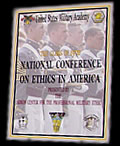 National Conference on Ethics in America National Conference on Ethics in America
The
United States Military Academy's
National Conference on Ethics in America
(NCEA) is an extraordinary venue that informs, instructs and inspires undergraduate
students who exhibit the qualities of character, commitment, honesty, courage
and discipline complimented wih a passion to serve our nation.
The theme for the 22nd annual conference, held in October 2007,
was: Providing the Nation with Citizens of Character.
Principles of Character
As an educator dedicated to the transformation of our nation through character
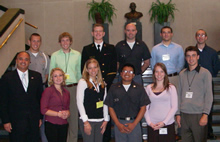 and leadership development, I was privileged to serve the conference as mentor and facilitator.
This unique role gave me the opportunity to interact with professionals dedicated to our nation's youth
and to exchange ethical concerns, principles, and solutions with the remarkable young people
who participated. These individuals exhibit great promise for the future of our nation.
Their personal and collective reflections on the principles of character were extremely inspirational.
and leadership development, I was privileged to serve the conference as mentor and facilitator.
This unique role gave me the opportunity to interact with professionals dedicated to our nation's youth
and to exchange ethical concerns, principles, and solutions with the remarkable young people
who participated. These individuals exhibit great promise for the future of our nation.
Their personal and collective reflections on the principles of character were extremely inspirational.
Conference Objectives
As specified in the NCEA guidebook's opening remarks by
Chairman Cooper Bradley,
the conference provides the platform to address and
solve significant ethical issues in society with a threefold objective:
- The first goal of the conference is to develop a national awareness of ethical behavior in the undergraduate community.
- The second goal of the conference is to improve collegiate codes of ethics and honor systems across the nation by drawing on the experiences and value systems of students from various colleges and universities.
- The third and final goal of the conference is to provide students with the opportunity to discuss issues of character and integrity with proven athletes, business and government officials, as well as leaders of character across varying fields of enterprise.
Diversity of Academic Institutions Represented
Although this outstanding event was held at West Point, it was not a military philosophy development venue. It provided a dynamic learning environment and promoted the sharing of ideas.
Attendees represented a wide range of academic disciplines including government,
law, medicine, science, engineering, education, business and the military.
Academic institutions represented included:
Timeless Principles
Surrounded by the historic setting of the U.S. Military Academy at West Point,
the interaction of attendees and mentors created a bond and balance through
viewpoints that consistently complimented the timeless principles of ethics,
leadership and character. The autumn foliage in the magnificent mountains of
New York, coupled with the high energy of a new school year,
enhanced the conference experience.
And one must not lose the significance of the cadet honor code to this conference:
"A cadet will not lie, cheat or steal or tolerate those who do"
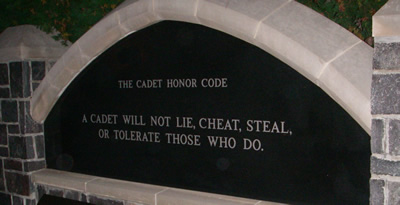
The future of America depends on leaders of character and the
NCEA is doing its part to
prepare individuals to fill those roles.
Citizens of Character
On Monday, October 22, 2007, the NCEA moved into full action mode with
opening remarks by Lieutenant General Franklin L. Hagenbeck,
Superintendent of the United States Military Academy,
who spoke about justice, rule of law, ethics, honesty, integrity, and honor as precepts essential to being an American.
After the inspiring words of Lt. General Hagenbeck, Len Marella,
a graduate of West Point and the founder and president of the Center for Leadership and Ethics,
discussed the importance of developing citizens of character as the defining issue of our time.
"Citizens of character seek to discover truth and decide what is right."
"To educate a person in mind and not in morals is to educate a menace to society."
Marella used the above words of
President Theodore Roosevelt to make his point,
Character must be continually developed and is inseparable from competence in order
for one to be a successful leader. "When competent individuals in any level of human
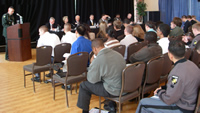 development or organization behave without character, the results are always negative."
development or organization behave without character, the results are always negative."
Marella also explained that the foundation of character and competence is trust.
"Trust is the foundation of character and essential to leadership, marriage, friendship,
employer and employees as well as to all relationships."
In concluding his introductory remarks, Marella spoke about the
importance of moral courage. He encouraged participants to renewed
dedication to moral courage, commitment, ethics, character and leadership
and shared with them a practical approach to consider for personal development:
- WATCH YOUR THOUGHTS —
THEY BECOME YOUR WORDS
- WATCH YOUR WORDS —
THEY BECOME YOUR ACTIONS
- WATCH YOUR ACTIONS —
THEY BECOME YOUR HABITS
- WATCH YOUR HABITS —
THEY BECOME YOUR CHARACTER
- WATCH YOUR CHARACTER —
IT BECOMES YOUR DESTINY
Athletes of Character
Next on the agenda, Eric Alexander,
an extreme athlete, shared his experiences of scaling the 29,035 foot summit of Mt. Everest with the audience.
Prior to the climb, Alexander struggled with pneumonia and the death of his best friend. He also survived
a 150 foot fall, developed pulmonary edema and needed to be airlifted to safety while training.
He persevered because he wanted to help a blind friend, Erik Weihenmayer, reach the top.
Alexander defied all odds against him and successfully climbed Mt. Everest with his friend Weihenmayer.
During his presentation, Alexander showed a video clip of Weihenmayer trusting totally in voice
directives as he walked across a ladder spanning a deep cavern, holding onto ropes and taking steps
to precisely set his ice boots on the ladder rungs. The clip dramatically highlighted the virtues of
courage and trust. Alexander then explained that character is the foundation of the recipe
success and discussed other qualities he felt were necessary ingredients:
- Courage to Serve Despite Fear
- Faith and Trust
- Teamwork
- Leadership and Integrity
- Perseverance
After the introductory remarks and plenary presentation, participants broke into small groups with their mentors.
My group, comprised of students from the
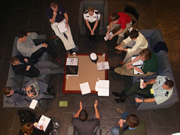 U.S. Military Academy, U.S. Naval Academy, University of San Francisco,
Marion Military Institute, Bradley University, Wake Forest, Claremont McKenna College,
Valley Forge Military College, University of Florida and the University of Wyoming,
had a spirited discussion on the character of Alexander. The selfless actions of Alexander
were seen in contrast to the scandalous behavior of many professional athletes.
U.S. Military Academy, U.S. Naval Academy, University of San Francisco,
Marion Military Institute, Bradley University, Wake Forest, Claremont McKenna College,
Valley Forge Military College, University of Florida and the University of Wyoming,
had a spirited discussion on the character of Alexander. The selfless actions of Alexander
were seen in contrast to the scandalous behavior of many professional athletes.
The group expressed their hope that the media would present stories of athletes of character, not just cover who wins and the sensational stories of negative behavior.
Social Responsibility
The Monday afternoon session began with a lecture by Colonel Donna Brazil,
Director of Psychology Studies at the United States Military Academy.
Col. Brazil is a 1983 West Point graduate who holds a Master of Arts and Doctor of Philosophy
in Social Psychology from the University of North Carolina. Besides serving the U.S. Army in
numerous command and staff assignments stateside and internationally, she currently serves
West Point as Academy Professor in the Department of Behavioral Sciences and Leadership.
Addressing the issues of social responsibility, Colonel Brazil stressed the importance of
being fully dedicated to family and community in order to make a positive impact on society.
She spoke about emotional intelligence whereby individuals must know themselves and be able
to understand others by seeing the world from their viewpoint.
"Leaders must have purpose, direction and motivation to accomplish the mission but must also
be dedicated to improving the lives of people and their organizations."
According to Col. Brazil, "true leaders are transformational since they impact change
on the family, neighborhood, community and organization."
Ethics and Responsibility
As a response to Col. Brazil's insights, my group discussed the importance of companies stressing
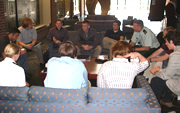 social responsibility, especially in regards to corporate ethics, pollution, health care and outsourcing.
We felt that in the long run a lack of social responsibility robs the employee, the shareholder,
the community, and the nation. Conversely, we expressed that community outreach
helps the bottom line since it inspires loyalty, goodwill and dedicated employees.
social responsibility, especially in regards to corporate ethics, pollution, health care and outsourcing.
We felt that in the long run a lack of social responsibility robs the employee, the shareholder,
the community, and the nation. Conversely, we expressed that community outreach
helps the bottom line since it inspires loyalty, goodwill and dedicated employees.
The students believe that America needs a renewed awareness to social justice issues including:
- Trendsetting transformational leaders
- Dedication to the environment including vehicle and gashouse emissions programs and ethanol usage development
- Renewed public transportation upgrades and city design improvements as a response to population growth
- Improvement of public works systems and increase of water purification systems due to water shortages and droughts
- Enhancement of electrical systems to prevent blackouts
Leaders of the must understand the consequences of organizational selfishness and must work to build collaboration among all aspects of the community for the good of society.
Enterprises of Character
Tuesday began with a plenary session by Dr. Dana G. Mead,
Chairman of the MIT Corporation. Dr. Mead is a 1957 West Point graduate, former Presidential Commissioner on
White House Fellowships and the first Professor of the Practice of Leadership at MIT.
"Business in America is no more ethical or unethical than other elements in society."
Dr. Mead, in his presentation on Enterprises of Character,
stressed that trust based on ethical reputation, must be inseparable
from good business and that illegal, immoral or unethical acts can never be justified.
"Ethics must be the driving force behind any good company and leadership awards
should be conferred upon those who exhibit high standards of moral and ethical behavior."
Dr. Mead also emphasized that an ethical, honest, and completely transparent, organization must be the goal of an organization, especially since globalization allows American companies to reflect values not only domestically but internationally. According to Dr. Mead, there are three major challenges of an enterprise in regard to ethical behavior:
- Profits
- Executive Compensation
- Conditioning the Public Market
Despite these challenges, a culture of character, integrity and ethics must be a business'
foundation. Dr. Mead quoted Marcus Aurelius in summarizing the call to ethics:
"Waste no more time arguing what a good man should be. Be one."
Transformational Character
Dan Clark, the primary contributor to the Chicken Soup for the Soul series
and author of 20 of his own best-selling books,
was the next plenary speaker. Clark is a motivational speaker who has flown
in fighter jets at twice the speed of sound, carried the Olympic torch in the 2002 games, and spoken to military personnel all over the world.
Clark gave an emotional presentation calling the audience to appreciate the values of America and to be dedicated to changing society through personal commitment. He stressed the following points during his presentation:
- One needs only to make a commitment one time. It should never have to be made again because one
should always keep his word.
- Character is expressed most clearly when no one else is around.
- Character must be cultivated and developed. It can never be bought but unfortunately it can easily be sold.
- Always take the higher ground.
- Be dedicated to change and have the courage to be better than you have ever been.
- Crisis can never break a leader. It brings the leader the opportunity to rise to the occasion.
- Integrity begins with self-respect.
- Character is always more important than popularity.
- Trials are always an opportunity to grow stronger.
Empowering the Future Leader
After these two plenary sessions, student leaders met for the round table discussion and shared profound insights during a highly empowering discussion which included:
- Aside from American colleges, society itself needs an honor code and people of character must set the example.
- America must make a commitment to change and all must make sacrifices.
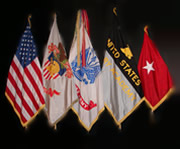
- Ethical society is impossible without ethical people.
- The courage to serve is the nation's recipe for success.
- Perseverance is required as the driving force behind transformational leadership.
- Social responsibility is rooted in personal responsibility.
- Leaders must be aware of a balcony mentality that others look up to them for guidance and example.
- There is always a way to do the right thing.
- Ethical behavior must be practiced not just discussed.
- Inspiring others through public acts of character is great motivator.
- Ethical courage inspires the first step which is always the move in the right direction.
- Success in life is guaranteed by ethical behavior and prevents having regrets.
We would do well to remember the words of
John Adams,
founding father and second President of the United States:
"The people have a right, an indisputable, unalienable, indefeasible, divine right to that most dreaded and envied kind of knowledge — I mean of the character and conduct of their rulers."
Senior Leader Sessions
On the final day of the conference, opening remarks were made by
Lieutenant General Franklin L. Hagenbeck, Superintendent of the
United States Military Academy, who spoke about the responsibility
of each person to exemplify character.
"If just a few individuals or sometimes even just one person crosses the ethical line,
it may compromise the reputation of the entire organization or even, in the case of a military
scandal, of the nation. Conversely, when individuals are dedicated to moral principles
and live accordingly, an epiphany that can dramatically impact the entire organization is possible."
The superintendent's remarks were followed by two question and answer panels comprised of leaders from business, government, and the military. The senior leaders included:
- Martin Abbott, Chief Operations Officer, Quigo
- Brigadier General (Ret) Leo A. Brooks, Vice President Boeing
- Terrence P. Finley, President, West Point Thoroughbreds, Inc.
- Theodore Griesinger, Chairman of the Board, Maguire Group, Inc.
- Deborah Churchill Luster, Entrepreneur
- Lt. Colonel (Ret) Haldane R. Mayer, Jurist, U.S. Federal Court of Appeals
- Colonel (Ret) John Rust, Former President, Rust Tractor Co.
- Jane M. Siebels, Chairperson, Green Cay Assets
- Frederick G. Smith, Vice President, Sinclair Broadcast Group
- Roland Smith, CEO, Arby Restaurant Group, Inc.
- James P. Sullivan, Jr., CEO, Sullivan Technologies, Inc.
- Brigadier General (Ret) Wesley B. Taylor, Jr., President and CEO George C. Marshall Foundation
These sessions led to a spirited interchange between the panel and attendees which gleaned the highlights of the conference:
- Organizations must not only demand accountability for negative behavior but reward positive behavior.
- Character needs to be cultivated within an organization.
- Ethics must be held to high standards within companies by boards of directors.
- An open door policy where individuals can address concerns at the highest levels of an organization should be cultivated.
- Perseverance in a culture of character is critical even if the competition is more profitable with behavior contrary to ethics. In the long term the positive reputation will bring rewards.
- Social responsibility inspires and in time attains buy in by others.
- Moral decisions must always rule the day.
- Integrity and moral courage are ethical principles which must always be followed, whether popular or not.
- Leadership goes beyond the title. An individual can be profoundly effective and
motivational in whatever role he plays for a company or society.
During the second question and answer session, another lively interchange highlighted the following:
- Leaders are the "keepers of the flame" in their organizations. They must make the right decisions and never allow mediocrity.
- Ethical is always inseparable from respectful even with disciplines and terminations which must be done in a dignified manner.
- Human beings are the most valuable resource within a company and therefore the term human resources must always be lived accordingly.
- Guidance, motivation and inspiration are needed by mentors within an organization, whether this takes place formally or informally.
- Always appeal to reason and if individuals are uncomfortable with an assignment they should be able to freely express their concerns and if possible relieved of the task.
- Leaders are always being watched both on duty and off duty. They must always live by high moral standards.
- Words are very powerful as motivators since they have the ability to affirm someone's dignity. Words are a treasure that should be used sincerely, gracefully and frequently within an organization to recognize, appreciate and affirm the values of others.
- The values of a company should be clear, understood and continually rewarded both privately and publicly.
- Character within an enterprise is like the embryonic fluid. Character sustains the life of an organization.
Conference Conclusion
The NCEA concluded with the panel representatives visiting groups of mentors and students to discuss the panel findings. Afterwards, student leaders from each group summarized their group's feedback for the entire assembly.
In the evening, all conference participants celebrated in an extraordinary banquet with a presentation by keynote speaker Martha Raddatz, author and ABC News Chief White House Correspondent. She complimented the sessions held throughout the week by accentuating the importance of a dedication to truth, even in the most seemingly ordinary events of life.
Hope for the Future
As I listened to the future leaders of our great nation speak of the significance of this event,
I was filled with the hope that America will be in great hands if these students continue
their dedication to be citizens of character.
And I was reminded of the words of Cicero:
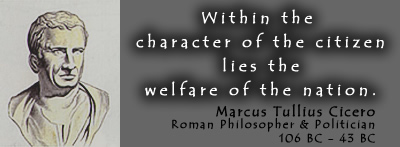

Vincent J. Bove, CPP
is a Board Certified Protection Professional, Board Certified Crime Prevention Specialist,
Certified Law Enforcement Instructor and U.S. Department of Justice Certified Community
Anti-Terrorism Awareness Trainer.
He is the 2007 New Jersey recipient of the prestigious
FBI Director's Community Leadership Award
and was hand-selected to serve as a facilitator and mentor for the 2007
National Conference on Ethics in America
and speaker for the 2008 conference at the United States Military Academy at West Point.
"Vincent J. Bove is considered one of the foremost
national experts on school and workplace violence
prevention, specializing in facility protection,
evacuations, terrorism prevention and leadership
training." -- U.S. Senate
You can visit Mr. Bove's website at
www.vincentbove.com
or email him at
vincent@vincentbove.com
|